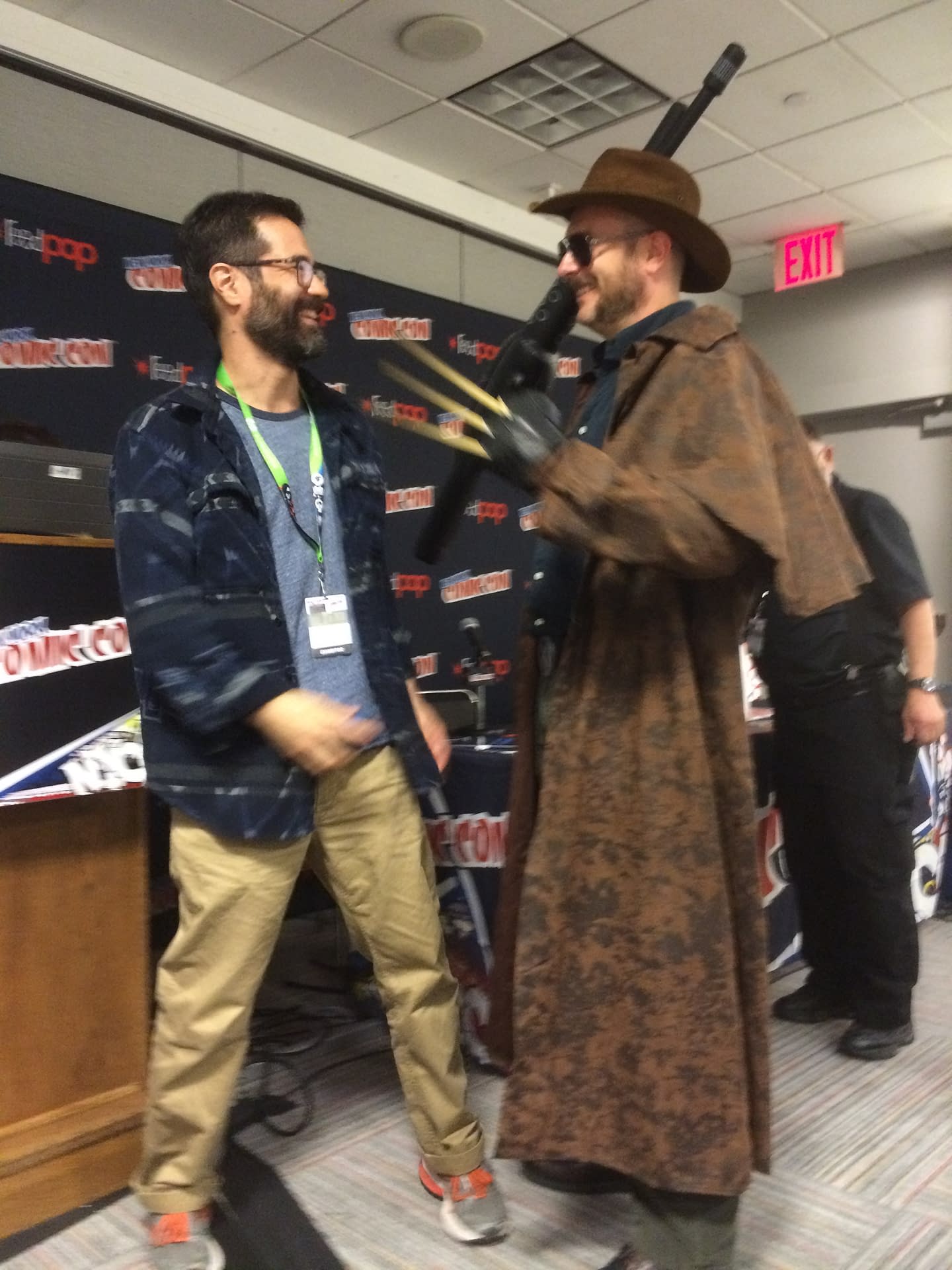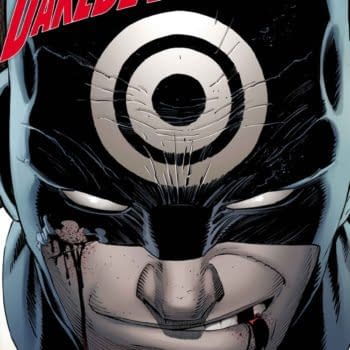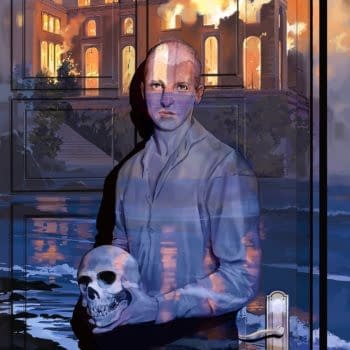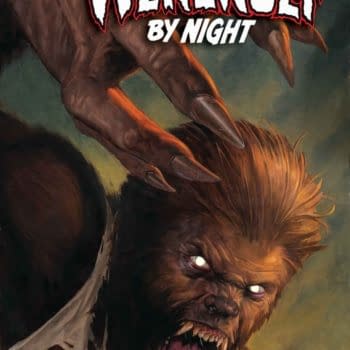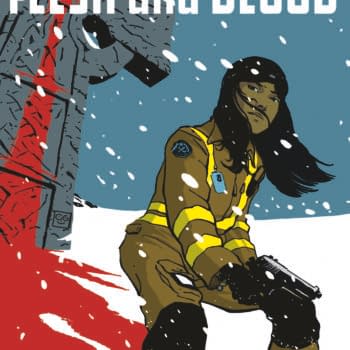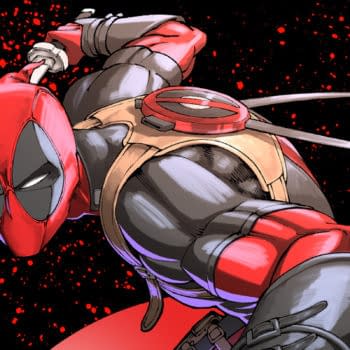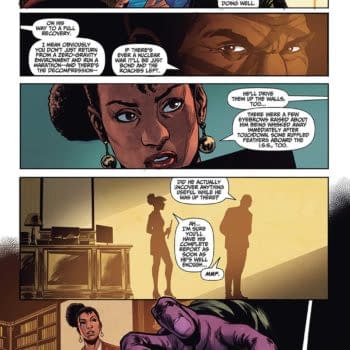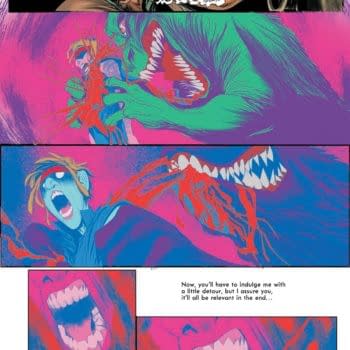Posted in: Comics, NYCC | Tagged: Asian-Americans, Comics, entertainment, greg pak, larry hama, marjorie liu, NYCC
Feeling Out Of Place – Greg Pak, Marjorie Liu And Larry Hama Discuss Asian-Americans In Comics At NYCC '15
Paul Gullas writes,
Greg Pak walked down the hall from his appearance on a Marvel panel in the "Pepsi Perfect Theater" to the Javits Center's room 1A05, where he moderated the "Asian American Comics and Creators" panel. This room was somewhat smaller than the one where he shared the stage with other Marvel writers, but the panel was considerably more engaging, with the guests sharing candid stories about their experiences in the industry, their struggles over writing about stereotypes, and wanting to create more diverse worlds in comics.
Joining Pak (Totally Awesome Hulk, Kingsway West) were Ethan Young (Nanjing: The Burning City), Wendy Xu (Mooncakes), Marjorie Liu (X-23, Dark Wolverine, Monstress), Janice Chiang (The Shadow Hero), Amy Chu (Poison Ivy, The Precious Scroll of Incense Mountain), and Larry Hama (G.I. Joe, Wolverine) , who strolled in late, but whose name came up several times as someone who has acted as a mentor figure to a number of the other panelists.
Despite having worked as a letterer in the industry since the 1970s, this was Janice Chiang's first-ever appearance on a panel. She mentioned that Hama first brought her into the business, and that she had recently worked on Gene Luen Yang's The Shadow Hero (an origin story for the Golden Age character The Green Turtle, the first Asian-American superhero). She'll be working on Poison Ivy with Amy Chu, as well as a "secret project" for younger girls that she had just found out half an hour before.
Young's presented a "world premiere" of an image from his yet-untitled next book from Dark Horse, a sci-fi version of the Mulan story (which they can't call Mulan for legal reasons). It touches on the one-child policy in China, a personal subject to him because his mother had to abort her daughter in the 1970s to make room for her second son. When she came to America, she always wanted a daughter, but had Ethan instead. So, she always called him by the Cantonese phrase for "little girl".
He wanted to imbue his work with more Asian-American narratives because he feels that there aren't enough of those characters in mainstream media. "It would be nice to see characters that look like me."
Feeling Out of Place
When asked about what motivates them to create and what it has to do with "Asian-American stuff", most of the panelists mentioned how they felt out of place in the world to some degree. While Pak had a great childhood growing up in Texas, as a half-Asian kid, he was hyperaware of race from a very young age and always knew that he was different. He said that learning the nuances of how other people communicated was key to his survival. Hama, despite being a legendary figure in the comics business, said that he always feels like the "odd man out." "I feel like I should be sitting at the kids table at Thanksgiving." Ethan Young said that the power fantasy aspects of superhero comics were "great when you're feeling a little marginalized by society growing up."
Liu explained how this feeling is expressed through her work. When she was small, she grew up deeply immersed in the Chinese side of her family. It seems like a cliche, she said, but she grew up with her cousins in her grandparents' laundry in Vancouver, Washington. As a biracial girl in school, there wasn't a lot of space to express her Chinese side. "As a child, if I would say, 'I'm Chinese-American', they would give me really funny looks and they would say, 'well, no you're not'". She said that this created deep questions for her that she still wrestles with to this day. When she started writing novels, she would always write characters that were "other". Her creator-owned Image Comics title Monstress explores this idea of what it's like to be the racial "other", using the supernatural as a metaphor. Monstress is also about the trauma of surviving a cataclysmic war and what it means to put yourself back together again, influenced by her grandparents' stories of growing up in China during World War II.
Diversity in Comics Industry vs. Other Fields
Many of the panelists have worked in other entertainment fields, and the general consensus was that the comics world has been much more open to diversity.
Pak, who has directed several films, said that working in comics have been "stunningly open" compared to his experiences in the film industry. He talked about how he kept introducing characters, starting with Janie Chin in Warlock, his first comic for Marvel, to Amadeus Cho, and nobody at Marvel ever said, "could we not make him Asian?" However, "it happened in the film industry!" with screenplays that he's written. The most heartbreaking experience he had was with a Korean producer who said, 'does this guy have to be Korean?'. He pointed out a cosplayer in the room who was dressed as General Howlett, a gay alternate universe version of Wolverine that Pak created in X-Treme X-Men. Pak said that when he came up the idea, the editors just said "OK, cool. Go for it."
Liu echoed similar experiences from working as a novelist. Editors and others in the publishing world suggested that she should change her last name because they said that "no one would buy a romance novel written by someone with a Chinese last name." She said that she knew another Chinese-American writer who had to change her last name because "they said that her name was ethnically tainted." She has faced the most resistance behind the scenes, and that she thinks that some publishers would prefer it when their writers "have no race." This was her introduction to how publishers think about their audience. Pak asked her if she ever considered changing her last name. She said that even her own family thought that she should change her name, to which she responded, "are you out of your mind?!"
Creating Diverse Worlds
Wendy Xu talked about her new webcomic Mooncakes, a paranormal romance between a witch and a werewolf. She wanted to make both characters Chinese-Americans, and since LGBT issues are very important to her, she decided to make it a queer paranormal romance. It will be updated twice a week, and this is her first foray into something longer.
Pak, whose new Dark Horse series Kingsway West will feature a Chinese gunslinger, mentioned the recent push where diversity has become something that the companies are aware of in a big way.
Liu said she teaches The Shadow Hero in her class at MIT. Most of her students are Asian-American, and they feel like the story is very familiar to them. She stressed that while the "optics of representation and diversity is wonderful, we need structural diversity behind the scenes, too. If you look at this panel, it's beginning to happen." Chiang said that she was very happy to hear that The Shadow Hero is being taught in Liu's curriculum.
Chu said that like Pak, she tries to make her comics reflect the diverse world that she lives in, and noted a recent example of putting a Filipino character into her Poison Ivy series. "To the extent that I can, and I don't think I have to, but I do feel this obligation to put in people of color in all my comics: Asians, Latino, Black, everything. I spent many years in New York and this is what I see."
To Write or Not to Write Stereotypes?
Pak said that he sometimes grappled with whether to use things that could be considered stereotypes in his writing. He said that while he loves Chow Yun-Fat and Jet Li movies, he's never written an Asian martial arts story because he doesn't want to feed that trope. "But at the same time, am I foolishly cutting myself off from something I love as a result?" He asked the other panelists about their thoughts.
Amy Chu said that she is grappling with it right now, with a series that she has been considering writing. She brought up the Strange Fruit controversy, and said that there could be a chance of this story being misinterpreted or coming off wrong. She wants to do the story, but on the other hand, there are so many bad depictions of that culture, and does she, as an Asian-American, want to do that? She also doesn't want to be pigeonholed as "the Asian doing the Asian stories".
Liu said that she has almost developed an allergic reaction to certain representations of Asians in media. "There's always the Chinatown episode. There's always the Yakuza episode. There's always the 'abused, beaten Chinese woman terrorized by the Chinese man' episode."
Young said he doesn't want the main character of his next book a martial artist because he doesn't want to play into that trope. But he also acknowledged that sometimes stereotypes exist for a reason.
Pak asked the audience how many of them were writers or aspiring writers, and after a show of hands, told them to keep at it because we won't have to worry about stereotypes if there's lots of other stuff there.
Pak noted that he thought it was awesome that other Asian creators such as Derek Kirk Kim and Gene Yang were being brought up because every time one of those books gets made, it makes it more possible for other books to get made. He said that everyone in the room has the power to change things by buying stuff. Amadeus Cho and Hercules were in a series together for 4 ½ years, and people bought it, so when Marvel wanted to pick a new Hulk, he came to mind. "The fact that you guys support stuff, means that, on a very practical level, we can keep making it. But then other stuff can get made later on down the line as well."



